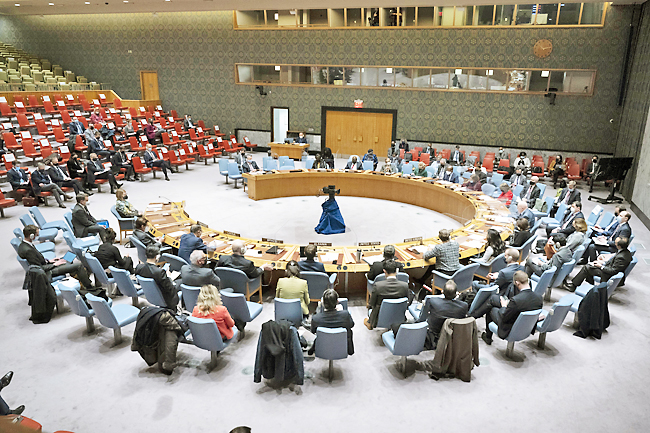KYIV (AFP) – Ukraine yesterday urged its Western allies to hit Russia with “tough sanctions” after President Vladimir Putin recognised two breakaway regions as independent and ordered in his troops.
Putin’s move – which came with tens of thousands of Russian soldiers on Ukraine’s borders and fears of an all-out invasion – was quickly and widely condemned by Kyiv’s allies in the West.
The United States (US), Britain and the European Union (EU) all moved to announce new economic sanctions within hours, as European and Russian stocks tumbled and oil prices surged over news of the recognition.
Russian troops were meanwhile believed to be deploying into Donetsk and Lugansk in eastern Ukraine, after Putin issued decrees ordering his army to assume “peacekeeping” functions in the separatist territories.
Western officials were not yet describing Putin’s moves as an invasion, but the situation remained deeply strained after weeks of tensions and days of intense shellfire on the frontline dividing the separatists from Kyiv’s forces.

In a statement issued during a visit to Washington, Ukrainian Foreign Minister Dmytro Kuleba said he was working with Kyiv’s Western friends “to impose tough sanctions against the Russian Federation”.
“Russia is trying to provoke Ukraine. Instead, Ukraine is showing wisdom and endurance to prevent an armed confrontation,” he said.
EU foreign policy chief Josep Borrell said the bloc would be adopting measures from yesterday afternoon.
“Our response will be in the form of sanctions, whose extent the ministers will decide,” Borrell told reporters in Paris.
The United Kingdom (UK) was also set to unveil a “first barrage” of sanctions against Russia, Prime Minister Boris Johnson vowed.
“They will hit Russia very hard and there is a lot more that we are going to do in the event
of an invasion,” he told reporters.
Washington took its first measures in the early hours yesterday, banning US persons from any financial dealings with the breakaway territories, and said more sanctions would be announced.
But it was unclear how far the West would go, after warning repeatedly of sanctions that would do severe damage to the Russian economy in the event of an invasion.
Russian troops were already known to be inside the two rebel regions and ordering more to deploy is unlikely to be enough for the West to trigger its worst-case response.
Putin announced he was recognising the territories, which broke away from Kyiv’s control in 2014, in a day of political theatre in Moscow.
After a dramatic televised meeting with his top government, military and security officials, Putin spoke to the Russian people in a 65-minute address from his Kremlin office.
In the often angry speech, Putin railed against Ukraine as a failed state and “puppet” of the West, accusing Kyiv of preparing a “blitzkrieg” to retake the separatist regions.
The move to recognise them, Putin said, was “a long overdue decision”.
He was then shown signing “friendship” agreements with rebel leaders that allowed for the official deployment of Russian forces to “maintain peace” and the sharing of military bases and border protection.
Within hours the UN Security Council held an emergency meeting, where US ambassador Linda Thomas-Greenfield described as “nonsense” Putin’s reference to the troops as “peacekeepers”.
“We know what they really are,” Thomas-Greenfield said, saying Putin’s address amounted to a “series of outrageous, false claims” that were aimed at “creating a pretext for war”.
Russia’s ambassador to the UN Vasily Nebenzya told the meeting that Moscow was still open to a diplomatic solution.
“Allowing a new bloodbath in the Donbas is something we do not intend to do,” he added, referring to the region encompassing Donetsk and Lugansk.



















































